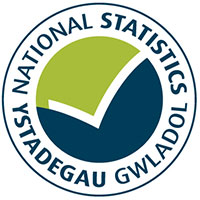For the period ending March 2023, data on children and pensioners in material deprivation and low income in Wales.
This is not the latest release in the series: Material deprivation and low income
Material deprivation is a measure of living standards. We define a person to be living in material deprivation if he or she is not able to access a certain number of goods and services.
Department for Work and Pensions (DWP) use the Family Resources Survey to publish statistics about children, working-age people and pensioners in material deprivation in their Households Below Average Income report (DWP), broken down for UK countries and regions of England.
Main findings
11% of children living in Wales between financial year ending (FYE) 2021 and FYE 2023 were in material deprivation and low income households. Low income households are those that had a total household income below 70% of the UK average household income, before housing costs were paid. The corresponding rate for England is 12% while that for Scotland is 10% and for Northern Ireland 8%.
11% of working-age adults living in Wales between FYE 2021 and FYE 2023 were in material deprivation and low income households. This is the same rate as that for Scotland. The corresponding rates are lower for England (9%) and for Northern Ireland (7%).
8% of pensioners living in Wales between FYE 2021 and FYE 2023 were in material deprivation (income is not considered for pensioners). The corresponding rates are lower at 7% for England, 4% for Northern Ireland, and 6% for Scotland.
Quality information
While FRS fieldwork operations were not identical to pre-pandemic in FYE 2023, they gradually returned throughout the year to something much closer to that than the period spanning the coronavirus (COVID-19) pandemic, when telephone interviewing only was used. The mode of interview for the FRS during FYE 2023 returned to face-to-face by default, with telephone used as an alternative by 28% of sampled households (across the UK).
Due to increased confidence in FYE 2022 data, last year DWP and Welsh Government resumed publication of data below UK level. DWP have enhanced confidence in data quality of this year’s (FYE 2023) sample, which was more representative than during the pandemic, with the profile of respondents closer to those who responded to the survey prior to FYE 2021.
As for last year, the new data points we have published for Wales span the FYE 2021 period but do not include the FYE 2021 survey data in calculations, as it is judged to be of low quality. This means that for the new data points, estimates formerly calculated as 3 year rolling averages are based on 2 year rolling averages that omit the FYE 2021 survey data.
For FYE 2023, survey responses about access to social opportunities or services (such as going on holiday or getting a haircut) asked as part of establishing the level of material deprivation were unaffected by the pandemic. This is unlike FYE 2022 where Covid-19 restrictions remained in place throughout the first quarter of the survey year, before being gradually removed.
As figures are based on three-year rolling averages, this means that for FYE 2023, estimates of material deprivation are not strictly comparable with the pre-pandemic period. To help users interpret the data more information on data quality in FYE 2022 and FYE 2023 can be found in DWP’s Technical Report.
Data
Datasets and interactive tools
Material deprivation for children, working-age adults and pensioners, before housing costs, Wales, three year financial year averages, Financial Year Ending (FYE) 2007 to FYE 2023 , file type: ODS, file size: 10 KB
Contact
Nia Jones
Email: stats.inclusion@gov.wales
Rydym yn croesawu gohebiaeth yn Gymraeg / We welcome correspondence in Welsh.

